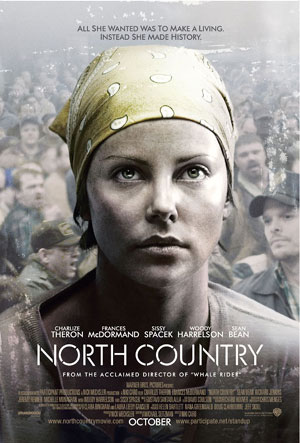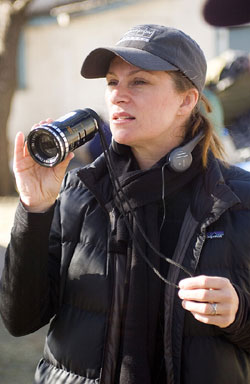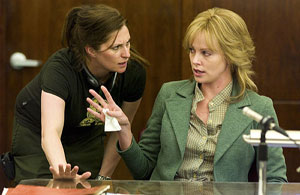 Niki Caro’s last film, Whale Rider, is a favorite of mine. It’s a triumphant story of the empowerment of one Moari girl in New Zealand, but it’s the kind of film that makes you feel like a better person just for having watched.
Niki Caro’s last film, Whale Rider, is a favorite of mine. It’s a triumphant story of the empowerment of one Moari girl in New Zealand, but it’s the kind of film that makes you feel like a better person just for having watched.
North Country is also about the empowerment of a single female, but maybe Tom Chau of Cinema Confidential put it best when we left the Toronto Film Festival screening: "I have never been more ashamed of my gender." But this isn’t ‘eat your vegetables’ cinema – Caro has crafted a gripping and moving story here.
In North Country Charlize Theron plays a single mom who gets a job in the local mine that supplies most of the region’s jobs and supports the economy. The problem is that the men in the mine don’t want women there, and Charlize and her female co-workers are subjected to constant sexual harrassment by the men. She fights back in court, making legal history.
The film is inspired by, but not based on a true story. It opens this weekend.
Q: After Whale Rider, when you were so hot, were you in demand for Hollywood films? Did you find that irresistible?
Caro: No it wasn’t irresistible at all. I resisted doing anything because I may have been a go to director after the success of Whale Rider, but I had a baby simultaneously, so I was really just at home in New Zealand being a new mother and not thinking about making another movie at all. I was sent a lot of stuff, as you can imagine, and I didn’t like anything – except this. I couldn’t put this down.
Q: Why this?
Caro: It was better than anything else. I couldn’t believe that these events had happened in such recent history. I couldn’t believe it. I couldn’t believe a studio was making this film. I was very impressed. I just couldn’t let it go, really. I thought it was a film that deserved to be made.
Q: The soundtrack is chock full of Bob Dylan. Obviously part of the reason is that he’s from Minnesota, but was there something else about his music that made it perfect for this film?
Caro: That’s a good question. When you’re cutting the film you use a lot of music, and you put a lot of music against the picture to see what works. I’m a big Dylan fan but I’m an equally big Springsteen fan. I tried some of Springsteen’s stuff in the movie, it just wouldn’t work. When I thought about it, his music is very narrative, but it’s almost exclusively from the point of view of the young working class American male. Everything I put of Dylan’s against the picture just worked like a charm.
We went to him to see if he’d write an original song for us. I went to meet him. I went from Auckland New Zealand to Camden New Jersey – which is a long trip just for a day! – to join him briefly on his tour and to discuss the movie with him. It was great, and then I just put more and more Dylan songs into the film!
Q: When did Charlize get attached – before you came on board? Caro: We were stalking one another. We were sort of truly running circles around each other at the time because our films had been distributed by the same guy, and we love him – we are both the spawn of Bob Burney. When we met we had so much in common, and we both loved the story, and we had very, very similar ideas about what the film should be. It was like a really great first date.
Caro: We were stalking one another. We were sort of truly running circles around each other at the time because our films had been distributed by the same guy, and we love him – we are both the spawn of Bob Burney. When we met we had so much in common, and we both loved the story, and we had very, very similar ideas about what the film should be. It was like a really great first date.
Q: Charlize has said that despite the serious subject matter, the set was very jokey.
Caro: Did she tell you that she was sexually harassing everybody all the time?
Q: I heard you were in on it as well.
Caro: I was a willing accomplice. For a film that has a great deal of psychological weight, and for a film that has such great actors giving us such great performances, it was a very un-PC working environment. The actresses were very playful, shall we say.
I can’t tell you what they did or what they said because it’s obscene! One thing I will tell you, because it’s my last interview today – I have done 50 television interviews back to back and nobody knows this. Do you know what a White Dog is? It’s a drink. It’s a drink in a shot glass made up of whiskey and breast milk. It’s delicious! There’s something really satisfying about that – it’s really making a girl’s movie. There’s nothing chick flick about that!
Q: Women make up most of the population but the films that Hollywood put out are chick flicks, which talk down to the audience. You don’t make films like that, but why do you think Hollywood does?
Caro: I can’t speak with any authority about Hollywood because I’m not from here, I’m a tourist. I made one film here, and I made it completely on my own terms. I think Hollywood is going to open up to the female experience – not because it’s socially conscious, but out of necessity, and because those are the stories that are going to be rare and unusual. It’s material that hasn’t been overmined, to use a mining analogy. They seem to be the fresh stories now, and if this film can be successful, hopefully we’ll see a lot more films of this kind of nature.
Q: Coming as a tourist, how do you approach this very regional story?
Caro: The same way I approached Whale Rider, which was a very New Zealand story but I was a total tourist in the Maori world. I approach it with humility and respect, and I go into those communities and ask for their collaboration but didn’t expect it – and I always get it. I love making films that way.
Q: How did you approach the research? How did you get to know the region so well?
Caro: That’s my big thrill. That’s my big filmmaking thrill, to go
places that I never would have ordinarily been able to go to and to be
able to be with the people. I took it really seriously and spent as
much time up there as possible. All of those actors know how to do the
jobs they do on screen. Frances McDormand, that’s her driving the
truck. She’s got a license to do so, and should she want to drive a
truck for a living, she could. It’s that degree of authenticity that I
need to feel secure in the work.
Q: What about for you, though? What did you want to know about that place?
Caro: Everything. I want to know how they speak. Getting the accents
right was very difficult and very important. I want to know what they
eat. If you ever look, there’s enormous attention paid to the food in
the film, and the food is regionally consistent. We had the ladies from
the Slovenian Hall making the food for the scene in the Slovenian Hall,
so it’s the right food. I want to know how they treat each other. What
they wear. Where they’re hanging out. What they’re drinking. I can’t
find any of that out without going there and experiencing it myself.
That’s how I can approach a film about the heartland of America with
some confidence. Because I know it.
Did you ever the film State and Main? It’s not like that. The opposite
of that is how to best explain how this particular Hollywood film
worked. We didn’t go and just fuck over the community and take what we
wanted and leave them with garbage in the streets.
Q: Was it easy for you to come from New Zealand filmmaking to the American film world? You managed to make this with little interference, right?
Caro: Warner Bros were amazing, and I think the studio and the producers recognized that I am an independent filmmaker and I don’t direct by committee. I wouldn’t have done a good job. So they just gave me a lot of space and they were entirely respectful of my creative choices.
Q: They gave you final cut?
Caro: I didn’t have it, contractually, but I showed them the director’s cut and they liked it so much that while they gave suggestions they said to take them or leave them. They left the film in my hands.
Q: You went out of your way to go out of a stereotypical love story in this film, but Woody Harrelson said that you cut something out of the end –
Caro: A line, yeah.
Q: -that would have left the audience with more of a feeling that [Woody and Charlize’s characters] would end up together. Why cut that?
Caro: It just seemed really trite after those two characters had been through so much. To end on a coy, ‘See you later, babe!’ note didn’t seem consistent with the depth of emotion in the film. I love Woody Harrelson, and I love the character of Bill Knight, and I love to death what Woody did with him, but it’s just something really a lot more unusual and a lot more honorable about him just helping this woman achieve what she did.
Q: We will see that on the DVD?
Caro: You won’t see that, but it’s a kick ass DVD. We had to drop so much brilliant stuff. There’s probably about 8 or 10 deleted scenes. Very amazing, very strong material.
Q: Then why delete them?
Caro: You delete them because when the film is assembled end to end it’s three and a half hours long. In the end however brilliant something is in a scene in itself, your responsibility is to the story as a whole. And you have a tremendous responsibility to the audience to keep the thing kicking along, and sometimes you just don’t need everything to tell the story.
Q: What was the most difficult scene to cut?
Caro: I saw it the other day and it just kills me, but I couldn’t. Every time I put it in the film it just slowed things down. It’s an amazing bit of performance by Charlize in the court. She says to the lawyer, ‘I know what you’re doing, you want them to think I hate all men.’ And the lawyer says, ‘Do you? Hate all men?’ And Charlize says, ‘Not all of them.’ I don’t do it justice, clearly. It’s an amazing piece of performance, and it pains me that it’s not in the film, but for people who are interested and for the big DVD audience out there, it’s a real treat.
Q: One of the things that Roger Ebert talks about is how Whale Rider earned a PG just because it has a bong in a shot. This is an R rated picture – was there ever the consideration for you to fight this time and get North Country a PG-13 so young people could see it?
Caro: No. Those things happened. They happened, and they happened recently. All of us that made the film, including the studio, felt a real responsibility to those situations and we weren’t going to dumb it down so children could watch it.
However we had to recut the film for airlines. I didn’t know this, but when you recut a film for airlines it has to be palatable for children, so it has to be a PG film. Of course it’s going to be virtually incomprehensible because we’re cutting away before any of those critical scenes of sexual harassment. I apologize to anyone who sees this film at 15,000 feet!
Q: Well, conversely do you think that even though that stuff is in it, this is a film that shouldn’t be rated R because it’s not violent or sexually offensive and that maybe this is a film that 15 or 16 year olds should be seeing?
Caro: Of course there’s a big argument for that, but you can only take on so much. Taking on the censorship in this country at this very conservative time would be a little foolish and totally futile. Q: Are you looking to return to New Zealand for your next film, are you staying here, or are you taking a break?
Q: Are you looking to return to New Zealand for your next film, are you staying here, or are you taking a break?
Caro: I am taking a little break to be with my family. Particularly with my daughter. The next film I make will be made wherever it’s most appropriate for that story. I have no objections to working on another Hollywood film because this experience has been so great, but it would have to be a story I feel connected to, and it would have to be made under the same set of circumstances.
Q: What do you think it is about Whale Rider that struck such a chord internationally?
Caro: I think moviegoers are very desensitized now. I think we live in a time where technologically we’re overwhelmed. We’re losing the bonds between one another, we’re losing community bonds. When you put a story like Whale Rider out there – I felt audiences all over the world just were desperate to connect with something real, and desperate to be genuinely, emotionally moved. You don’t need a big budget to do that. You don’t need a lot of computer generated imagery, you don’t need bells and whistles, you just need a great story and a great cast.
Fight… for your right… to good movies once in a while! On our message board.